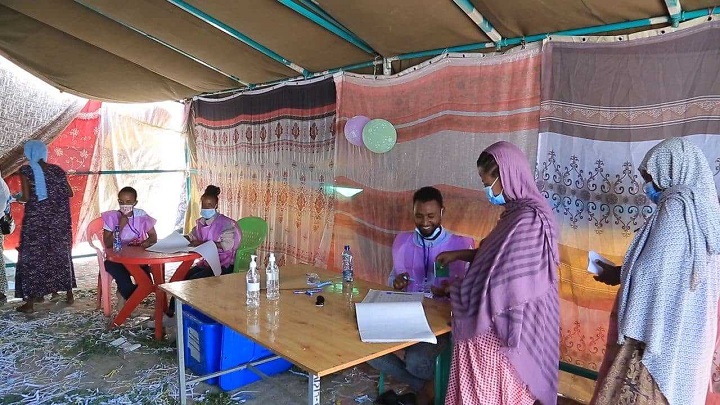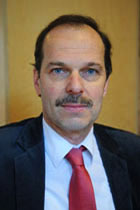The Ethiopian June 2021 elections: a step to political normality?

 Prof. Jon Abbink is an anthropologist-historian and carries out research on the history and cultures of the Horn of Africa (Northeast Africa), particularly Ethiopia.
Prof. Jon Abbink is an anthropologist-historian and carries out research on the history and cultures of the Horn of Africa (Northeast Africa), particularly Ethiopia.
Ethiopia held its parliamentary and regional state council elections on 21 June 2021 under tense conditions of the armed conflict in Tigray Region, threats of instability and insurgent attacks in western parts of the country, and the ongoing health threats due to COVID-19 making large gatherings like elections still risky. It was therefore all the more remarkable that the actual voting went ahead in a largely orderly manner. But there were disturbances in some constituencies, like harassment or intimidation of perceived opposition figures and local observers, some logistic issues such as lack of enough ballot papers, and one attack on a polling station. Despite these incidents, there was no massive derailment of the electoral process, and none of the doom scenarios predicted by certain Western media, pundits and governments materialised. The observers of the African Union, the Eastern Africa Standby Force and more importantly of local Ethiopian civil society organisations and the Ethiopian Human Rights Council, did not report problems on a massive scale.
The elections were, however, held in 436 of the total of 547 parliamentary constituencies. Those in the remaining 111 constituencies that were left out in the first round are expected to be held on 6 September, although in Tigray Region (conflict-torn since 4 November 2020) they do not seem likely, due to the instability and ongoing sabotage of the insurgency of the Tigray People’s Liberation Front (TPLF), the erstwhile federal power-holders until March 2018. Also, in the regions of Benishangul-Gumuz, some parts of Western Oromia, Somali Region and in several zones in the South in the process of forming a new Regional State the voting was delayed due to instability and some logistical issues (in Somali region). And the electoral dominance of the ruling Prosperity Party (PP) in this election was all too obvious, with 410 out of 436 contested seats secured. A number of opposition parties, two of them Oromo-based ‘ethno-nationalist’ parties, had for various reasons boycotted the elections: the first, the Oromo Liberation Front, because of a party split and not registering on time; the second, the Oromo Federalist Congress, complaining about some of their leaders being imprisoned (but without saying that they were held there on criminal charges). This boycott was responsible for the lack of competition in, notably, the Oromo Region.
In the regional state councils, the opposition gained more seats. Thus, the elections did not return the monolithic bloc of 99.8% or 100% of ruling party seats that we saw under the rule of EPRDF (Ethiopian Peoples’ Revolutionary Democratic Front, dominated by the TPLF) in 2010 and 2015. All the same, there is an absolute majority of the PP in all councils and in the parliament, making it (too) dominant. This may evoke alienation notably among voter constituencies that (would have) supported the boycotting or defeated parties. Even PM Abiy Ahmed, after hearing the results, “… admitted that the elections did not result in the expected heterogeneous House.”(1)
Still there are reasons why the elections were unmistakably a move forward. To say this sounds like the cliché we heard in the previous two rounds, where several foreign observers said that those elections were ‘a step in the right direction’ while they were not. We also remember former US President Obama mistakenly saying in July 2015 that the May 2015 elections had been “democratic” while they were nothing of the kind. The June 2021 election was, however, clearly better than the 2015 one in the sense that pre-election competition in the field and debates in the media were strong, and with the NEBE trying to secure a level playing field. Despite current national unrest and volatility in Ethiopia, the electoral process was appreciated by a large majority of the voters and proceeded relatively well. To speak of “electoral disorganization” and “sham elections” was disingenuous, despite the conditions of threat and uncertainty. Before the elections, and mostly as a result of decades of repression and unaddressed national problems under EPRDF, frequent deadly ‘ethnic clashes’ in various parts of the country were indeed seen, as well as a high number of IDPs and lingering humanitarian problems, mostly the unfortunate legacy of the pre-2018 regime. Additional issues were the unexpected COVID-19 crisis and its adverse economic effects, the challenges around the GERD Nile dam due to Egypt’s constant subversion of Ethiopia in international fora, and domestically of course the ongoing insurgency of TPLF remnants in Tigray in the past months.(2)
All things said, the elections at least gave the PP and its PM Abiy Ahmed more legitimacy and a mandate (if not an obligation) to reinforce the 2018 political and socio-economic reform agenda and to work on political stabilisation, peace and equitable economic development. Support for the PM and his course on the Tigray conflict - the major short-term post-election challenge - was also clear from the recent mass demonstrations in Addis Ababa. The schemes apparently being considered in some Western countries and their collaborators to work towards his replacement are worrying and have a tinge of neo-imperialism by aiming to interfere in a sovereign country (that just had elections).
Here are five specific reasons why the elections, despite the problems, were a significant step forward:
- The overall peacefulness and the turnout of voters. This may reflect the desire of the Ethiopian people for stability and normality in challenging times, with a vicious armed conflict destabilising the country (Tigray). Over 90% of the more than 37 million people who had registered in fact voted - that is a large majority. It is likely that the turmoil in Tigray (6.5 mln inhabitants) has even contributed to the rest of the Ethiopians (105 mln), deeply disturbed as they are by the conflict, to go and vote for the PP and its prime minister. Even Ms. Rahel Bafe, Chair of the Joint Council of Political Parties (with most opposition parties represented), said about the election: “I don’t believe that it has failed the public’s trust.”. Still, there were procedural problems and failings in several places, and at least one major violent incident.
- The remarkable role of the reformed National Electoral Board of Ethiopia (NEBE). It was not a tool of the powers-that-be. Ms. Birtukan Mideqsa, a former opposition party member and political prisoner under the repressive TPLF-EPRDF regime before 2018, knew the problems and challenges that opposition parties face in Ethiopia and tried hard to create equal campaigning and voting opportunities for all citizens. Under her leadership, the NEBE has done an extraordinary job, showing itself to be a more professional, open and independent election overseer than ever seen before in Ethiopia, despite the challenges it met. The improvement in NEBE’s role - in preparing, monitoring, performing the complex logistical operations in these difficult conditions and with scarce funding, and in handling the many complaints and appeals - is to be acknowledged. Ms. Birtukan also took the trouble to publicly thank the staff of the NEBE and the thousands of young election workers that tried to make the election a success. The statement of the US was in no way constructive, and somewhat bizarre in view of its own dismal controversies during the last presidential election of 2020 and the ongoing manipulation of electoral district boundaries and laws in several US states.
- Political competition and campaigning before the elections were not optimal but still significant, compared to previous elections. NEBE tried to create the required electoral opportunities and said it was prepared to deal with all opposition party complaints of harassment. Before and during the election, the Chair had also given repeated reprimands to local members of the ruling PP for arrogant behaviour and intimidation in certain constituencies.
- Post-election controversies and refusals to accept loss were not expressed in mass demonstrations or violent reprisals. Opposition parties that felt intimidated, abused or cheated went to the NEBE and/or to the courts, not to the streets. There were many disputes, e.g., the Ethiopian Citizens for Social Justice party (or ‘Ezema’) filed 207 complaints with the NEBE. Also, the Balderas Party (competing in the Addis Ababa Region) on 30 July rejected the results in the capital, announced it would go to court, and asked for re-elections. So far, in six constituencies the elections were redone and in eight a recount was ordered.
- There were innovative aspects, trying to frame this election as one element in Ethiopia’s political renewal. At the request of the PM, the voters were asked to each plant a tree on election day, in line with his Green Legacy Initiative - framed as a national effort. While this was unorthodox and may not have been correct under the electoral law (the incumbent government asking voters to do such additional things), it was taken up enthusiastically by most voters. Some 87.4 million seedlings were planted on election day.
In sum, in shaky national conditions, the elections were far from ideal. Should the elections not have been held? This was suggested by many Western pundits and by some Ethiopian opposition figures, asking for a ‘national dialogue’ or an ‘all-inclusive government of salvation’ first; No, these calls for such a broad national dialogue, while of course sounding good, had a disingenuous ring to them, betraying some unwillingness to assess the country’s political situation in full, and trying to get party-political representation via a lengthy non-electoral detour. To prefer a ‘national political dialogue’ above elections may also express a disdain for the voters, who turned up in large numbers (78%). The pleas for (another) election delay were made because of the alleged risk of massive disruption, voting sabotage and violent protest. But they were perhaps more fed by certain opposition parties fearing to lose.
After the publication of the results of the 6 September second election round, the new House of People’s Representatives (federal parliament) will be installed in October this year. Despite the PP’s dominance it is clear that more diverse voices will be heard - although by far not enough. PM Abiy Ahmed announced that in his new government he would include some opposition figures who took part in the elections. This may not placate the boycotting opposition parties, but hopefully Ethiopian politics can enter a new phase of normality and deliberative parliamentary democracy, and also allow the Tigray armed conflict to be brought to a close.
Notes
- As noted, the elections for the federal parliament were held in 436 of the total of 547 constituencies, of which 410 seats were won by the Prosperity Party. The NEBE Facebook account has the official results as per 10 July 2021. The 2nd voting round on 6 September will yield results for another 73 constituencies (Not yet for the 38 in Tigray)."
- This latter conflict developed into an aimless and destructive enterprise, with much of international press and media fanning the flames via biased and often misinformed reporting.
Photo: Voting in Ethiopia, 21 June 2021 (Courtesy of the National Electoral Board of Ethiopia).
This post has been written for the ASCL Africanist Blog. Would you like to stay updated on new blog posts? Subscribe here! Would you like to comment? Please do! The ASCL reserves the right to edit, shorten or reject submitted comments.


Comments
Add new comment
Unlike most western 'scholars' and media outlets that threaten the Ethiopian national interest, this comment is by far balanced and indicated the real Ethiopian politics.